

Planetary Ball Mill PM 300
The Planetary Ball Mill PM 300 is a powerful and ergonomic benchtop model with two grinding stations for grinding jar volumes up to 500 ml. This setup allows for processing up to 2 x 220 ml sample material per batch. Thanks to the high maximum speed of 800 rpm, extremely high centrifugal forces result in very high pulverization energy and consequently in short processing times.
THE POWERFUL, ERGONOMIC PLANETARY BALL MILL
- Max. speed 800 rpm, large sun wheel
- Up to 10 mm feed size and 0.1 µm final fineness
- 2 grinding stations for jars of min. 12 ml and max. 500 ml, jars of 12 – 80 ml can be stacked (two jars each)
- GrindControl to measure temperature and pressure inside the jar.
- Aeriation lids to control the atmosphere inside the jar
- Bench top model, touch screen, storable SOPs and cycle programs, 5 different jar materials for dry and wet grinding
FAST & POWERFUL
- Loss-free size reduction down to the submicron range
- Wet grinding yields particle sizes in the nanometer range (<100 nm)
- Variable speed from 50 to 800 rpm, speed ratio 1:-2
- Milling with up to 64.4 x acceleration of gravity
- Batch-wise processing with max. 2 x 220 ml sample
- Possibility to stack jars enables simultaneous processing of 4 samples
SAFE AND EASY HANDLING
- Easy and safe clamping of the grinding jars thanks to lockable sun wheel
- The Safety Slider prevents starting the machine without securely clamped jars
- Perfect stability on the lab bench thanks to FFCS -technology
- Comfortable parameter setting via Touch display
- Automatic grinding chamber ventilation with directed air stream for perfect jar cooling
- Programmable starting time
- Both grinding jars are freely accessible
- Ergonomic clamping unit with smooth surfaces
SETTINGS & OPTIONS
- Dry and wet milling possible
- Suitable for long-term trials, 99 h max.
- Programmable breaks e.g. for cooling
- Automatic calculation of the total process time
- Direction reversal helps to minimize caking effects
- Smart service interval notification based on usage
REPRODUCIBILITY
- Reproducible results due to speed control
- Indication of load-defined speed, independent of set speed
- 12 SOPs and 4 cycle programs can be stored
- Power failure backup ensures storage of remaining processing time
SAFETY FIRST: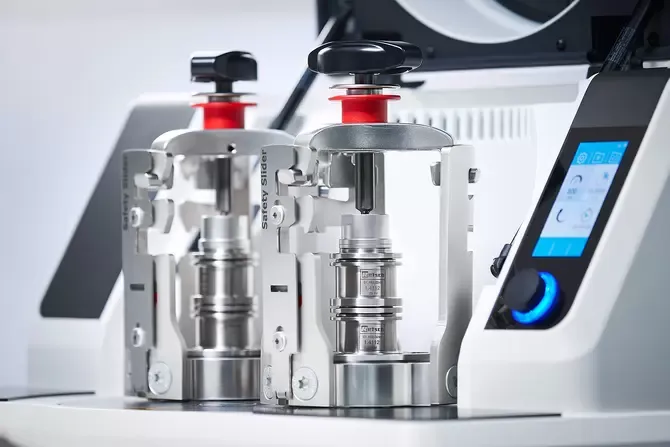
AUTOMATED NOTIFICATION OF CLAMPING FORCE
Operation of the RETSCH planetary ball mills is particularly safe. They feature a robust Safety Slider which ensures that the mill can only be started after the grinding jar has been securely fixed with a clamping device. The self-acting lock ensures that the jar is seated correctly and securely. This proven solid mechanical system is less failure-prone than electronic solutions - the user has full access to the sample at any time. When the electronic system fails, it is not possible to unlock the jars, for example. A unique safety feature of the PM 300 is an acoustic signal and notification in the display when the clamping unit has been fixed with the required force of 25 Nm. RETSCH offers a convenient clamping aid to facilitate the process. This is particularly helpful when the machine is operated in the upper speed range between 600 and 800 rpm.
WET AND NANO-SCALE GRINDING WITH THE PM 300
Wet grinding is used to obtain particle sizes below 5 µm, as small particles tend to get charged on their surfaces and agglomerate, which makes further grinding in dry mode difficult. By adding a liquid or dispersant the particles can be kept separated.
To produce very fine particles of 100 nm or less (nano-scale grinding) by wet grinding, friction rather than impact is required. This is achieved by using a large number of small grinding balls which have a large surface and many friction points. The ideal filling level of the jar should consist of 60 % small grinding balls.
For more details on jar filling, wet grinding and sample recovery watch the video.
TITANIUM DIOXIDE IN 125 ML JAR
The graphic shows the result of pulverizing titanium dioxide (TiO2) at 650 rpm and 800 rpm in the PM 300 and the net processing time. With the higher energy input at 800 rpm, the particle size decreases faster. However, the increased warming effects at 800 rpm should also be considered, as they might make longer breaks necessary.
APPLICATIONS IN MECHANOCHEMISTRY
RETSCH Planetary Ball Mills are perfectly suited for processes like mechanical alloying or mechanosynthesis. For most reactions, the 1:-2 speed ratio of jar to sun wheel of the models PM 100 and PM 200 is fully adequate, as the ball charge produces enough impact energy. However, greater energy is required for some reactions. Here the PM 400 MA can be used with the increased speed ratio of 1:-2.5 or 1:-3.0.
The PM 300 works with a speed ratio of 1:-2, but in contrast to other models, it reaches up to 64.4 x acceleration of gravity thanks to the maximum speed of 800 rpm and the large sun wheel. Together with the option to use four small, stackable grinding jars sized 12 to 80 ml for small scale operations, or two jars sized up to 500 ml for upscaling purposes, this planetary ball mill is highly suitable for research applications in mechanochemistry.
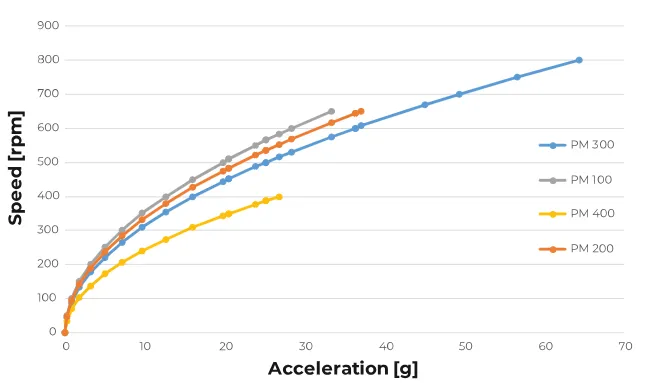
TYPICAL SAMPLE MATERIALS
RETSCH planetary ball mills are perfectly suitable for size reduction of, for example, alloys, bentonite, bones, carbon fibres, catalysts, cellulose, cement clinker, ceramics, charcoal, chemical products, clay minerals, coal, coke, compost, concrete, electronic scrap, fibres, glass, gypsum, hair, hydroxyapatite, iron ore, kaolin, limestone, metal oxides, minerals, ores, paints and lacquers, paper, pigments, plant materials, polymers, quartz, seeds, semi-precious stones, sewage sludge, slag, soils, tissue, tobacco, waste samples, wood, etc.
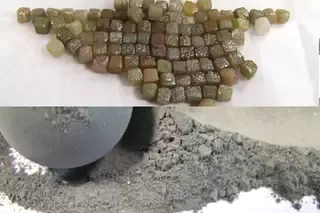
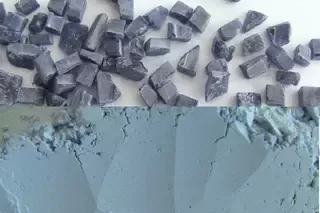
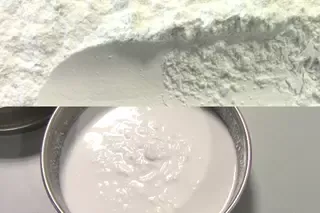

Very hard, abrasive:
11 g sample 50 ml tungsten carbide grinding jars 4 x 20 mm tungsten carbide grinding balls 4 min at 400 rpm | Hard-brittle:
85 g sample
| Nano grinding:
100 g sample + 190 ml sodium-phosphate solution
| Medium-hard, tough:
125 g sample
|
TECHNICAL DATA
| Applications | pulverizing, mixing, homogenizing, colloidal milling, mechanical alloying, mechanochemistry |
| Field of application | agriculture, biology, chemistry, construction materials, engineering / electronics, environment / recycling, geology / metallurgy, glass / ceramics, medicine / pharmaceuticals |
| Feed material | soft, hard, brittle, fibrous - dry or wet |
| Size reduction principle | impact, friction |
| Material feed size* | < 10 mm |
| Final fineness* | < 1 µm, for colloidal grinding < 0.1 µm |
| Batch size / feed quantity* | max. 2 x 220 ml |
| No. of grinding stations | 2 |
| Speed ratio | 1 : -2 |
| Sun wheel speed | 50 - 800 min-1 |
| Effective sun wheel diameter | 180 mm |
| G-force | 64 g |
| Type of grinding jars | optional areation covers, safety closure devices |
| Material of grinding tools | hardened stainless steel, tungsten carbide, agate, sintered aluminum oxide, zirconium oxide |
| Grinding jar sizes | 12 ml / 25 ml / 50 ml / 80 ml / 125 ml / 250 ml / 500 ml |
| Stackable grinding jars | 12 ml / 25 ml / 50 ml / 80 ml |
| Setting of grinding time | digital, 00:00:01 to 99:59:59 |
| Interval operation | yes, with direction reversal |
| Interval time | 00:00:01 to 99:59:59 |
| Pause time | 00:00:01 to 99:59:59 |
| Storable SOPs | 12 |
| Storable cycle programs | 4 |
| Measurement of input energy possible | yes |
| Interface | USB, RASPI |
| Drive | 3-phase asynchronous motor with frequency converter |
| Drive power | 2,5 kW |
| Electrical supply data | 200-240 V, 50/60 Hz |
| Power connection | 1-phase |
| Protection code | IP 20 |
| Power consumption | ~ 3335 VA |
| W x H x D closed | 745 x 525 x 580 mm |
| Net weight | ~ 118 kg |
| Standards | CE |
| Patent / Utility patent | yes |
